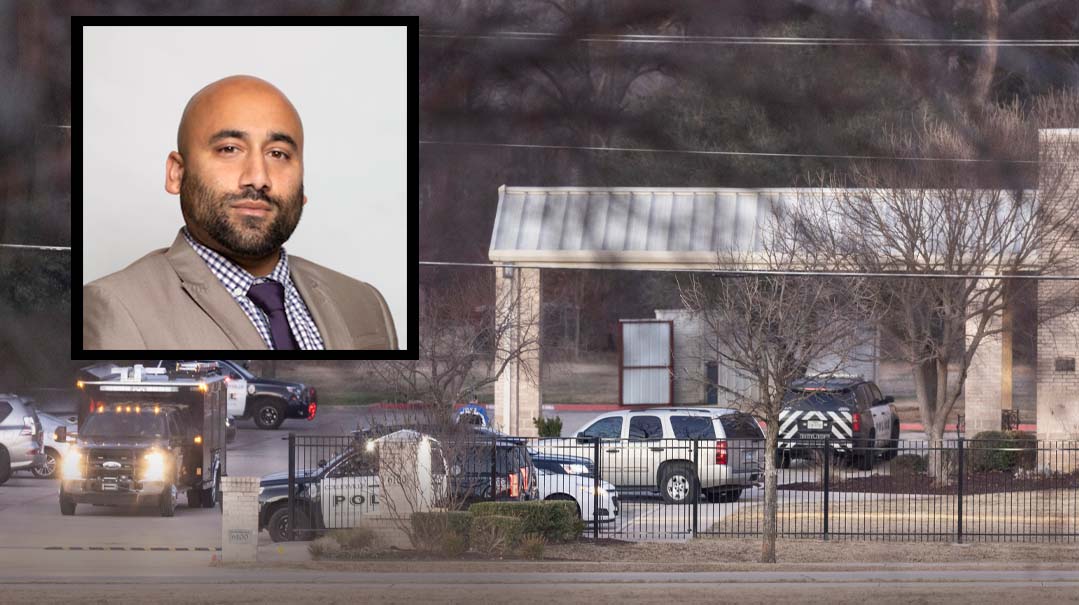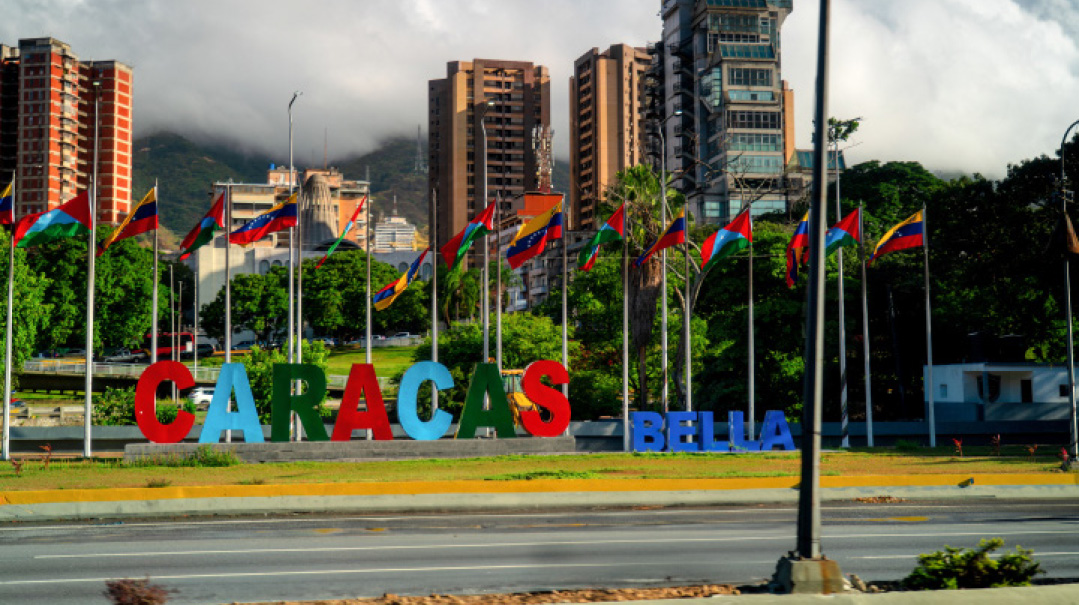Is Terror Britain’s Newest Export?

"Heightened anti-Jewish bias within Britain’s Muslim community constitutes a danger — one that elites seem determined to ignore"

Photo: AP Images
The gunman who held congregants at a Reform synagogue hostage two weeks ago in Colleyville, Texas, made the small town the latest grim addition to a growing list of recent terror attacks on Jewish life in America.
But in the days after the hostages ran free and the attacker was killed by police, the case gained a global dimension with the news that the attacker, Malik Faisal Akram, was of British Pakistani descent.
Akram, 44, from Blackburn in England’s northwest, had traveled to the United States two weeks before the attack, staying at homeless shelters in the area of the Reform temple. He bought a handgun on the street, and railed against Jewish power during the 11-hour long siege, as well as demanding the release of an al-Qaeda operative held at a Texas prison.
Seventeen years after the London bus bombings, the attacker’s origins have drawn attention to the state of Britain’s own fight against terror.
According to Dr. Rakib Ehsan, a research fellow at the the Henry Jackson Society, a London-based think tank, the attack is only the latest alarm to sound for the country’s anti-terror policies. And as a patron of the interfaith charity Muslims Against Anti-Semitism, Ehsan says that heightened anti-Jewish bias within Britain’s Muslim community constitutes a danger — one that elites seem determined to ignore.
What does the fact that the attacker evaded security services and was allowed to travel to the US say about the state of the anti-terror effort in the UK?
The fact that the UK essentially exported a radical Islamist anti-Semite to a fellow Western country should be cause for national embarrassment. The reality is that this was a systems failure of epic proportions. Akram was twice referred to the UK government’s Prevent program, which is supposedly designed to address radicalization risks and stop “at-risk” individuals from participating in forms of terrorist activity. Akram was referred to the program as recently as 2019. In 2020, the UK’s MI5 security services investigated Akram as a possible terror threat but closed his case after a month. He was reported to police a year ago by a local councillor over his radical anti-Jewish views — but no further action was taken. The trail leading up to the Texas synagogue siege means that the credibility of the UK’s anti-terrorism structures is once again being called into question.
How is Britain’s de-radicalization program meant to work, and how effective is it overall?
There are several de-radicalization programs in the UK for those who have been involved in extremist activity, and it’s safe to say that they have had their fair share of problems. The “risk-reward” trade-off when it comes to de-radicalizing those who have a history of extremism and terror-related activity should always be in favor of public safety — but that has not always been the case in the UK.
Convicted terrorist Usman Khan had completed two rehabilitation schemes during the eight years he spent in prison and following his release. In November 2019, he stabbed two people to death during an Islamist terror attack at an offender-rehabilitation conference in London Bridge. In February 2020, another convicted terrorist — Sudesh Amman — carried out an Islamist terror attack shortly after leaving prison, stabbing two people in South London.
Efforts to de-radicalize terror-related offenders are further complicated by well-documented radicalizing influences in prisons.
Terrorism doesn’t exist in a vacuum — it taps into pockets of extremism. So just how prevalent is anti-Semitism in the UK’s Muslim population?
There are cases of British Islamic extremists scouting Jewish targets — including Birmingham’s central synagogue — when plotting acts of terror.
The existing data shows that believing anti-Semitic conspiracy theories and holding anti-Jewish views are problems that are relatively concentrated within British Muslim communities when compared with the wider general population. A 2017 report by the Institute for Jewish Policy Research (JPR) revealed that when set against the general population, British Muslims in the study were more likely to believe that Jews have too much power in Britain (8 percent versus 27 percent), exploit the Holocaust for their own purposes (10 percent versus 25 percent), and possess feelings of “group superiority” over non-Jews (13 percent and 28 percent). Compared to the general population, British Muslims are also notably less likely to believe that British Jews make a positive contribution to British society.
My own research on behalf of the Henry Jackson Society think tank has found that there are heightened levels of anti-Semitism in more socially segregated elements of the British Muslim population.
You tweeted “so much for Jewish control” about the failure of prominent media outlets to classify the attack as an act of anti-Semitism. Where does this blind spot stem from?
There are sections of the British broadcasting establishment that continue to report unquestionably anti-Semitic incidents in an incredibly suspect manner — all the more interesting when one considers the anti-Semitic conspiratorial beliefs surrounding supposed Jewish control of the global media. Some of the reporting of the Texas-synagogue siege by the BBC has gone out of its way to avoid mentioning the term “anti-Semitism.”
There has been much discussion of Akram’s mental condition — as if he were some kind of tortured soul deserving of sympathy.
There is clearly a “discrimination pyramid” in place where other forms of prejudice are reported with a greater degree of enthusiasm. While I have come across the notion of “Jewish privilege,” I do not see much of this when it comes to how targeted forms of violence and intimidation are reported by sections of the British press.
The unfortunate reality is that British Jews — seen by some as a hyperprivileged religious minority undeserving of support — have been let down by their national broadcasters’ coverage of the Texas synagogue siege.
Returning to the issue of parallel societies as a breeding ground for extremism, how should Britain balance the legitimate rights of religious communities to their traditions — which sometimes go with a certain degree of insularity — and the need to ensure good civic behavior?
There is a reason why three in four British Muslims believe that Britain is a good place to live as a Muslim. Compared with other European countries with notable non-white Muslim populations, Britain ranks highly when it comes to anti-discrimination protections on the grounds of religion. It is home to some of the strongest equality bodies in the world.
However, the British model of state-backed multiculturalism has over-celebrated forms of difference and underappreciated the importance of emphasizing common ground. This has contributed towards the development of “parallel societies” — residentially, socially, and economically segregated communities with minimal levels of positive intergroup contact.
The UK’s commitment to religious freedom should not be at the expense of broader social cohesion, which is under threat from extremist anti-democracy ideologies that can easily take root in segregated parts of the country separated from the liberal-democratic mainstream. Respect for the rule of law, equality of opportunity, and democratic processes are critical in this context.
Are there geographical hotspots for the Islamist terror risk in the UK?
Islamist activity tends to be socially segregated and economically deprived in nature. British Islamism has taken root as a serious problem in England’s three largest cities — London, Birmingham, and Manchester. London’s eastern boroughs — Tower Hamlets and Newham — are a particular cause for concern. Both contain largely segregated Muslim communities, whose members originate from deprived agricultural parts of Sylhet in northeastern Bangladesh.
Several Birmingham wards, such as Springfield and Sparkbrook in the city’s Hall Green parliamentary constituency, contain deprived, poorly integrated, predominantly Pakistani-origin neighborhoods. Much of Birmingham’s Pakistani-heritage population originates from economically dislocated rural villages in the Azad Kashmir region.
In parts of Manchester such as Cheetham Hill, Libyan-origin communities have provided breeding grounds for Islamist extremism. Leading counter-terrorism officials have even suggested that the “British-Libyan jihadi nexus” has not been given sufficient attention by the authorities. Along with other cities, there is a string of industrial towns in Northern England such as Blackburn — where Akram was from — that also have their fair share of problems with Islamist extremism.
Given the very mixed results of anti-radicalization policies in the UK so far, what can actually be done to combat the problem of parallel societies going forward?
The metropolitan political establishment in the UK continues to be plagued by tribal identity politics and paralyzing forms of political correctness. It must do away with its prevailing cultural reluctance to tackle worrying social trends in ethno-religious minorities for fear of offending divisive and unrepresentative political organizations and social movements.
The UK government needs to identify the parts of the country that are socially segregated, materially deprived, and have a history of Islamist activity — essentially “failed neighborhoods.” This should be followed by the creation of localized social-cohesion and counter-extremism plans. To combat the higher-than-mainstream levels of anti-Semitism in British Muslim communities, the country needs to adopt a localized, multi-agency, joined-up approach — involving educational institutions, good-faith civic association, social services, and local police forces.
However, there needs to be a degree of centralized regulation — public institutions and community-based agencies that have succumbed to the prejudices of narrow identity politics and radical political correctness are a liability from social-cohesion and counter-extremism perspectives.
(Originally featured in Mishpacha, Issue 896)
Oops! We could not locate your form.






